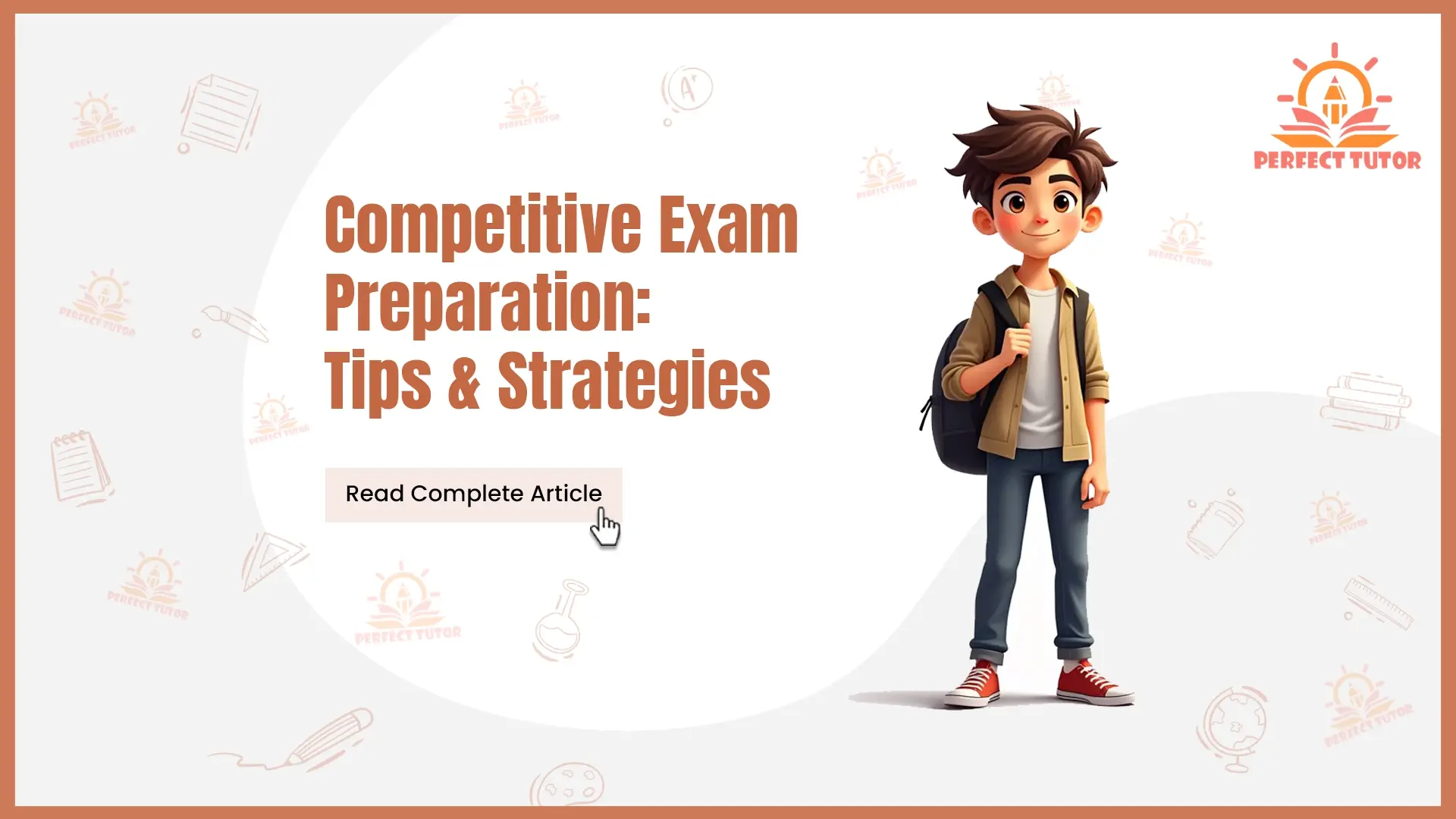Competitive Exam Preparation: Strategies, Tips, and Resources
Preparing for competitive exams can be tough, but with the right strategy, focus, and resources, it is possible to excel. In this blog, we provide readers with valuable information to prepare for various competitive exams including Banking, JEE, and NEET.
This article highlights essential preparation tips, detailed information on the exam syllabus, and customized study strategies for success. We also provide practical advice on creating a study timetable, solving mock tests, and staying focused. Whether you are preparing for a government job, preparing for a medical exam like NEET, or preparing for an engineering entrance exam like JEE, you will find useful guidance here.
By following these steps, candidates can develop a strong foundation, improve their understanding, and maximize their chances of success in the exam. Readers will benefit from clear guidelines on time management, prioritization of topics, and self-study tips.
Why Competitive Exams Are Important
Competitive exams in India provide entry into prestigious positions in the government sector, banks or educational institutions. These exams provide job security, financial stability and a balanced work-life environment.
Top Benefits of Cracking a Competitive Exam
Job Security: Competitive exams open the doors to lifelong employment, especially in government or banking jobs.
Financial Stability: Many of these jobs offer attractive salaries, pensions and other benefits.
Reputation: Holding a position in a prestigious government or corporate institution enhances a person's status and respect in society.
List of Major Competitive Exams
Here is the list of popular competitive exams in India:
Banking Exams: IBPS PO, SBI PO, RBI Grade B
Medical Exams: NEET (National Eligibility cum Entrance Test)
Engineering Exams: JEE Mains, JEE Advanced
Other Exams: UPSC, SSC CGL, NDA, RRB NTPC
Preparation Strategies for Competitive Exams
To succeed in any competitive exam, candidates need a well-organized study plan. Here are some preparation strategies:
1. Set S.M.A.R.T Goals
S.M.A.R.T stands for Specific, Measurable, Achievable, Relevant and Time-bound goals. Set these goals for each study session to ensure progress.
2. Time Management
Make a balanced timetable. Prioritize subjects based on your strengths and weaknesses, and give more time to challenging areas.
3. Regular Classes and Coaching
Whether you opt for online or offline classes, regular attendance is a must. Skipping classes can disrupt your learning process.
4. Daily Revision
Revision is very important to remember what you have learned. Dedicate at least one hour daily to revision to strengthen your memory of important concepts.
5. Mock Tests and Previous Year Papers
Solving mock tests and reviewing previous exam papers will help you get familiar with the question pattern and time limit.
6. Clear Your Concepts
Focus on understanding the concepts rather than memorizing them. This makes it easier to solve difficult questions in the exam.
7. Focus on Self-Study
Self-study is as important as coaching. Make your personal study plan and stick to it consistently.
8. Stay Positive
Maintaining a positive attitude can improve your performance. Have faith in your ability to succeed and don't be discouraged by failures.
Detailed Preparation for Banking, JEE, and NEET
Banking Exam Preparation
For banking exams like IBPS and SBI PO, candidates should focus on Reasoning, Quantitative Aptitude and General Awareness. Here is the detailed syllabus:
Reasoning: Verbal & Non-Verbal Reasoning Topics
Quantitative Aptitude: Simplification, Number Series and Data Interpretation
General Awareness: Focus on current events, banking regulations, and the economy
Preparation Tips:
Read daily current affairs updates.
Practice mental maths for speed in quantitative aptitude.
Attempt mock tests regularly.
NEET Preparation Tips
NEET is a medical entrance exam and its syllabus includes Physics, Chemistry and Biology. Here's a guide to handling it effectively:
Biology: Focus on NCERT textbooks. These form the basis of many NEET questions.
Chemistry: Divide your preparation between organic, inorganic and physical chemistry.
Physics: Focus on solving problems and understanding the ideas behind the rules and formulas.
NEET Preparation Time Table
Allocate more time to Biology (50%), Chemistry (30%), and Physics (20%).
Divide the day into two-hour study blocks and take breaks in between.
Make sure at least one hour per day is devoted to revision.
NEET Preparation Tips:
Follow the NCERT books diligently.
Take mock tests regularly to simulate the exam environment.
Focus on topics of high importance like genetics, thermodynamics, and chemical bonding.
JEE Preparation Tips
JEE is the gateway to admission into engineering colleges. Candidates must have a strong understanding of physics, chemistry, and mathematics.
JEE Preparation Strategy:
Maths: Practice from the previous year's question papers. Focus on Calculus and Coordinate Geometry.
Physics: Conceptual clarity is important. Focus on topics like electrostatics and mechanics.
Chemistry: Divide the preparation into organic, inorganic and physical chemistry. Pay special attention to problem-solving in physical chemistry.
JEE Exam Tips:
Create a realistic study schedule and stick to it.
Instead of memorizing, focus on conceptual clarity.
Use online mock tests to keep track of your progress.
Common Mistakes to Avoid in Exam Preparation
1. Procrastination
Delaying study sessions will only create more stress as the exam date approaches. You just stick to your study timetable.
2. Ignoring Revision
Studying without revision reduces the ability to remember. Regularly revising what you have learned maintains your understanding for a long time.
3. Skipping Mock Tests
Skipping mock tests can lower your confidence. These tests are important to measure your exam preparation.
Tips to Stay Focused During Preparation
Avoid distractions: Study in a quiet place and turn off gadgets.
Take regular breaks: Studying continuously can be tiring. Take short breaks to refresh yourself.
Stay healthy: A healthy body supports a focused mind. Eat a balanced diet and get enough sleep.
Frequently Asked Questions (FAQs)
Q1. How many hours should I study for a competitive exam?
It is recommended to study for 5-6 hours daily with regular breaks for best performance.
Q2. Is self-study enough for NEET?
Yes, self-study, combined with the right resources like NCERT books and mock tests, can lead to success in NEET.
Q3. What are the best books for JEE preparation?
Books like "Concepts of Physics" by H.C. Verma and "Mathematics" by R.D. Sharma are widely recommended.
Q4. Which course is best for competitive exams?
The best course for competitive exams varies from exam to exam. Find a coaching class for JEE, NEET, UPSC or bank exams that matches your learning style.
Q5. Which exam is easy to crack?
Some exams are easier than others, it depends on your abilities. SSC or bank exams can be easy because of their predictable pattern.
Conclusion
Competitive exams require a focused, strategic approach. With the right preparation strategies including setting goals, daily revision, solving mock tests, and regular practice, candidates can succeed. Whether preparing for banking, NEET or JEE, candidates must stay disciplined, maintain positivity and focus on self-study. With these tips, you will be on your way to cracking your desired exam.



 +91 8700847275
+91 8700847275
 +1 8009616567
+1 8009616567